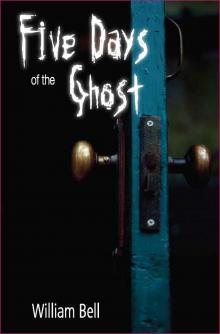- Home
- William Bell
The Blue Helmet Page 4
The Blue Helmet Read online
Page 4
She and I ate our meals in the kitchen, except at night, when she sometimes invited me down to her apartment for a snack.
Reena didn’t talk much about herself. I barely remembered her from my childhood—just the one extended visit when I was little and my mom was still alive. My father never mentioned her until the day he packed me off to live with her like a bundle of used clothes you’d ship to a charity. And she didn’t pelt me with questions about myself. Maybe my father filled her in on what a failure and lost cause I was, maybe not. She didn’t seem to care.
Which was just fine with me. If I had to admit it, I’d say I didn’t mind living with her at all. I liked her. As long as I did my work, she left me alone. I didn’t have to go to school or answer to anybody. I liked the fact that I was earning my keep, even a little extra. I was saving up to buy a used TV for my room. True, I had an axe hanging over my head—Sergeant Carpino’s threats—but I decided to let that go for a while. All that had happened back home. There was nothing back there for me, anyway.
I was emptying the dishwasher, my face bathed in steam, while Reena cut chunks of beef—the dinner menu, she announced, was beef stew or nothing, she was too tired to put two choices on the menu that day—when the phone rang.
“I’ll get it,” she said, wiping her hands on her apron. Behind me I heard, “Hello. Oh, hi, Doug. Yeah, he’s right here.”
I shook my head, mouthed No, and lifted a stack of hot plates to the shelf.
Reena held her hand over the mouthpiece. “At least say hello to him,” she said. “He—”
I headed for the door. “Come on, Lee,” she insisted. “Do me a favour.”
Muttering to myself, I took the phone from her.
“Hello.”
“Hi, Lee. How’s it going?”
His voice was friendly, casual, but forced. In the background I heard the whine of a pneumatic wheel gun, the hiss of a hoist, a clang.
“All right.”
“Reena tells me you’re doing real good at the café.”
“I guess.”
“That’s great. Glad to hear it.”
Silence. Reena rolled her eyes, waved her hand as if to say, I give up.
“Things are working out okay, then.”
What did he want me to say? Yes, father, you can put your guilt back on the shelf? You threw me out but it’s the best thing you could have done for me because now I’m happy and content and life is wonderful?
“I’m fine,” I said.
“That’s good, so—”
“Not that you give a shit.”
There was another, longer pause.
“Well,” he said, his voice flat, “I guess I better get back to work. I’m in the middle of a tune-up.”
“Don’t let me keep you.”
He hung up without saying goodbye.
She was one of the regulars—meaning she turned up a few mornings a week, sat in one of the booths with a coffee, and nibbled at a fried egg sandwich while she busied herself on her laptop. I figured her for a student at the high school up at 18th and Birmingham, or maybe the college. She had shoulder-length black hair with a tight wave in it, light brown skin, and dark eyes.
The first day I saw her, I went to bus her table, even though all she had was a plate and cup. I plunked down my plastic tub and picked up her plate. “Another coffee?” I asked.
She looked up from the screen and gave me a wide smile. “No, thanks,” she said. “Better not. You the boss?” she asked playfully.
“No. I’m the hired help.”
“You don’t even rate a name tag?”
It took me a second to catch on. “Lee,” I said.
“Well, Lee,” she said, draining her cup and placing it inside the tub. “Don’t forget this.”
I stepped back as she wriggled to the edge of the booth and stood up. She was my height, well built, and she smelled lemony. She closed the laptop and shoved it into her backpack.
“See you,” she said, shouldering the pack, and she was out the door before I could get her name.
So the next time I saw her, on a rainy morning a few days later, I worked my way toward her booth, collecting cups and plates and cutlery, wiping down the tables. She had finished her sandwich, but the coffee stood beside her notebook, three-quarters full, a skim of cream on top. She was wearing a tight pink sweater and black denims, and in profile she was enough to stop the breath in my throat.
“How’s it going?” I said, taking her plate.
“Not,” she said, reversing her pencil and erasing some numbers from the page. “Know anything about periodic tables?”
“The only tables I’m familiar with are usually covered with dirty dishes.”
She laughed, sat back, and tossed the pencil down.
“It’s not fair, you know,” I said.
“What’s not fair?”
“You know my name …”
“Eileen,” she offered.
We made small talk for a few minutes while the traffic hissed by on the street outside, the café door opened and closed as customers came and went, the tinkle of spoons and soft rumble of talk around us. I could have gone on like that for hours. Eventually, she looked at her watch and packed up her stuff and left, leaving the fragrance of her citrus cologne behind her.
It went like that for a couple of weeks, and then one Friday she came in earlier than usual, as if in a hurry, and got herself a coffee without ordering anything to eat. While she tapped away at her keyboard, she kept looking toward the door. I hung back. I had decided to ask her to go out with me and I was working up the courage. There wasn’t much chance, I figured—her a serious student, me a dropout living above a café with my aunt—but I was going to give it a try.
I was taking a break at my booth, waiting for my chance, when a stranger came in. A tall, college type—designer backpack, leather jacket, expensive trainers. Probably had a flashy sports car parked in the college lot. He marched straight to Eileen’s booth, planted his feet, and began to talk. I couldn’t make out what he was saying but his body language was loud and aggressive.
She said something and he grabbed her arm. She shook him off, and this time I heard her tell him “No!”
He clutched her arm again, with two hands this time, as if he meant to drag her out of the booth. I scrambled out of my seat.
“Let her go!” I said.
He turned to me, his face reddened. “Mind your own frig—”
I drilled him in the rib cage, felt my knuckles connect with bone. He grunted in pain, dropping Eileen’s arm, and I shoved him back. His eyes signalled what he would do, and before he had the chance, I stepped closer and threw two solid punches into his face before he hit the floor. He groaned and rolled over, struggling to his hands and knees.
“Stop! Stop!” I heard behind me, but the words didn’t register. Fists pummelled my shoulders. Somebody was screaming.
“Get up,” I hissed, ready to give him more.
Someone was still pounding away at me. I swirled to face him. It was Eileen, her face livid, her teeth clenched. Why was she hitting me? I grabbed her wrists. “Calm down,” I told her, as she yanked free of my hold. “It’s all right—”
“What? You’re going to beat me up now?” she yelled.
I became aware of faces at the tables, staring at me as if I was in a cage.
Eileen’s eyes flared, her fists clenched. “What’s the matter with you?” she shouted. “You could have hurt him.”
“But—”
“You think I needed you to save me, is that it, hero? Christ, you’re as bad as him!”
“I—”
She quickly gathered her things, helped the guy to his feet and, after glaring in my direction, helped him out the door.
Reena was not pleased. Later that morning, after she had hung the CLOSED sign in the window, she sat me down in the kitchen. “I’m trying to run a business here,” she began.
“He was going to hit her,” I said, cutting her off. “I ha
d to do something.”
“Whether you had to do something or not isn’t the issue,” Reena said, tucking her hair behind one ear. She shook a cigarette free of the pack, plucked it out with her lips, and lit up. “What’s important is how you handled the problem—assuming you had to do anything at all.”
“What else could I have done?”
“Use your imagination,” she said. “But keep in mind what I just said. I don’t run a couples’ counselling service. You tell people like them to take their problem somewhere else. That’s it.”
“Guys like that need a lesson.”
“Lee, think about it. You hit him so he wouldn’t hit her. What’s wrong with the picture?”
“What do you mean?” I asked.
Reena stubbed out her cigarette on the saucer she was using as an ashtray and stood up.
“I got some work to do,” she said.
There were things I couldn’t say to Reena. About the darkness that gushed into my brain like water from a broken pipe. About the compulsion in my muscles, the voice that screamed in my ear to hit and hit and pile up hurt, to keep going until whoever was on the receiving end had collapsed to helplessness. I couldn’t tell her that I knew exactly what she meant. Knew she was right.
Before I got kicked out of school the second time, I had a girlfriend the kids had nicknamed Barbie—her real name was Beth—because she was slender and had long blonde hair framing a pretty face. All the girls envied her and all the guys wanted her. Maybe girlfriend is the wrong word. Maybe it was all in my mind.
We went to the movies one Saturday night, necked through the whole picture. Afterwards, I had it bad. I saw only her. Heard only her. Wanted to escort her to school in the morning, to walk her home at the end of the day. I engineered things so I met her between classes. I called her every night.
We went out a few more times. I began to think she was mine. Thought she wanted it that way. Then one day when I went to meet her after school at our usual place—outside the main office—she didn’t turn up. I asked one of her friends if she had seen Beth.
“Before or after she got into Freddie Tanner’s Audi?” she sneered.
On the phone that night, Beth’s mother told me Beth couldn’t come to the phone. She had too much homework.
A few days later, I was waiting in the library parking lot across from her house when Tanner dropped her off. I saw his profile through the side window, hair swept back off his forehead, a big ring on his finger, before he peeled away.
I called out to her. She didn’t look happy to see me, but she acted cool, as if it was her brother she’d been out with. She walked across the road and sat on a bench off to the side, away from the library door.
I stood in front of her, hemming her in, and demanded to know why she’d been ignoring me. A toxic brew churned in my guts—humiliation, anger, frustration.
“I just didn’t feel like being with you lately,” she said, as if that explained everything.
“What are you talking about? I don’t get it.”
“Look, Lee, no offense, but sometimes you’re like … like a blanket.”
I felt the tingle in my limbs that sometimes came before the black rush. “What the hell are you talking about?”
“You’re suffocating me. Every time I turn around, you’re there. I need room to breathe.”
“I thought we were—”
“We were what? We went out a few times. I like you.”
“Then why were you with him?”
“Because he’s fun, that’s why. And he doesn’t hover over me like a demented guardian angel.”
“You’re nothing but a tramp,” I blurted.
Her eyes narrowed. “Don’t you dare call me names, you pathetic loser!”
I slapped her so hard her head snapped back. Eyes wide with shock, she jumped to her feet, her hand on her reddening cheek.
I tried to put my arms around her. “Beth, Beth, I’m sorry. I didn’t mean—”
She struggled free. “Don’t touch me! Don’t come near me!” She ran into the street. A car skidded to a stop, tires yelping and horn blasting. The driver leaned out. “Watch where you’re going, you stupid—”
But she was gone up her front sidewalk and into the house.
I stood in the parking lot, shaking, as the darkness ranted in my veins.
NINE
MY SECOND DELIVERY TO Cutter’s was similar to the first—like entering a bank vault. He was polite but, after handing over his empties, got rid of me as fast as he could, slamming the door behind me. My third delivery—this time bringing aspirins, antacid, and dental floss rather than the meds—he greeted me in a V-neck sweater, cords and loafers. He was clean-shaven and his hair was combed, although he was still as pale as milk. He invited me in and almost smiled.
He handed me a key. “Mind picking up my mail for me?”
I returned to the verandah and opened the metal box, retrieving a bunch of envelopes and one package. Cutter locked the doors behind me, raked his hair with his fingers. “Did you make sure to secure the mailbox?”
I nodded. He took the mail and dumped some of it onto an already overburdened table. The rest he fed into a huge shredder under the table, ignoring the cascade of paper ribbons spilling from its maw.
“Excuse me for a second,” he said, and went to his desk. “I’m just printing off the morning’s gleanings.” He punched a button. A printer began to crank out pages.
“The morning’s what?” I asked.
Cutter jumped up and snapped his fingers. “A seat,” he said to the ceiling, then scooted into the kitchen. He rushed back with a wooden chair and set it down by the desk.
“It’s part of my inquiries,” he began, looking at a spot over my right shoulder. “I scan certain newspapers and research services on the Net every day.” He held up a finger, as if delivering a lecture. “If you ever use the Net remember that they can track every move you make, plus read all your e-mail, plus invade your computer, spy on all your files, and leave cookies behind. You’ve got to stay sharp. Using the Net is like sitting naked in a glass house. Where was I? Oh, right. I also read certain magazines. You have to be careful, ‘cause most mags are just propaganda sheets for them.” He pointed to a large-screen TV in a cabinet, the doors hanging open. I hadn’t noticed it before. “Got three dishes on the roof, all technically illegal. I’m tuned in to everything. It’s the only way I can keep track of them.”
“Them?”
“Yeah.”
“Who’s Them?”
“You mean you don’t know?”
“I don’t get out much,” I replied.
Cutter smiled. His eye began to twitch. “You’re making fun of me.”
“No, really, I’m not,” I said. Which was true. “It’s just that, well, I have no idea what you’re talking about.”
He searched my face, as if reading a map. “Okay, I believe you. I’m not very clear sometimes, am I?” In an instant, he was on his feet. “Want some tea?”
“Um, sure.”
A few minutes later we were sitting again, this time in his kitchen. There was one large window that probably looked out onto the back yard, but it was covered with thick curtains. I would have bet that there were aluminum disks hanging between the curtains and the glass. The window in the back door, which was locked with dead-bolts, was also covered.
The countertop and sink were piled high with used dishes that gave the room an overripe odour. Cutter had poured tea for both of us and seemed to have forgotten his already. I sipped mine—black. He hadn’t offered milk or sugar.
“Take today’s research,” he said, picking up where he had left off. “I’m tracking down the financial statements of the corps”—corporations, he explained when I tried to interrupt—“that profit from sweatshop labour in the athletic clothing industry. They subcontract the manufacturing to jobbers in the third world—China, the Philippines, Mexico, Vietnam, lots of places where people are starving and will work for next to nothing—an
d the jobbers in turn subcontract to others who run the sweatshops. That way, the big corps in Europe and North America that sponsor tennis matches and basketball players and golf tournaments can pretend they’re not accountable for what goes on in the sweatshops. If you go up to the mall on the Queensway you can find a half-dozen stores that sell their stuff. A shirt that costs twenty-three bucks—guess how much they pay the girl who sewed it together.”
“Don’t have a clue.”
“Eight cents.”
“Eight cents?”
“There are twenty-two separate operations to produce the shirt. Five to cut the material, six to attach labels—like that. The process is all broken down right to the second. Literally. The factory produces a shirt every six point six minutes. Know what that means?”
I played along. “What?”
“The pressure on the assembly line is enormous. A worker performs the same miniscule operation about two thousand times a day, sitting at her machine twelve to fourteen hours at a stretch.”
Eyes alight, spit flying, Cutter tumbled on with more of the same, his words gushing out of his mouth as if his speaking apparatus couldn’t keep up with his brain. Then he stopped.
“More tea?”
I drained my mug. “No, thanks.”
“Sorry to ramble on,” he said, rubbing his hands together.
Ramble was definitely not the word for Cutter’s headlong torrent of words. He looked around as if he’d just realized he was in the kitchen.
“I gotta get this mess cleaned up.”
“That’s what the dishwasher is for,” I said.
Cutter eyed the appliance as if it had magically appeared only seconds before and said sheepishly, “Forgot how to use it.”
I stood up. I doubted that the guy who manipulated all the electronics in the other room couldn’t use a dishwasher, but I also doubted he was focused enough to manage it. His mind was on his research.

 Stones
Stones Fanatics
Fanatics Alma
Alma Speak to the Earth
Speak to the Earth Five Days of the Ghost
Five Days of the Ghost Only in the Movies
Only in the Movies Julian
Julian Just Some Stuff I Wrote
Just Some Stuff I Wrote Zack
Zack Forbidden City
Forbidden City Death Wind
Death Wind No Signature
No Signature Crabbe
Crabbe